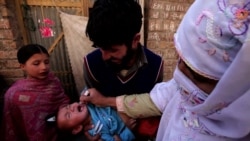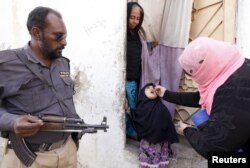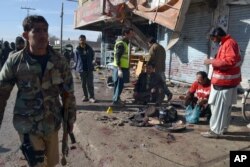Three new cases of polio were reported in Pakistan last week, bringing the total number of worldwide polio cases this year to five — all of them in Pakistan.
The country remains front and center in the global fight to eradicate the highly infectious disease from the planet.
The new cases were reported in Quetta, the capital of Balochistan province, as well as in Hangu and Peshawar in Khyber Pakhtunkhwa province.
The first polio case of the year, reported in Pakistan’s largest city, Karachi, was a 3-year-old boy who had received at least seven doses of polio vaccine.
“Unfortunately the child was suffering from malnutrition, and the immunity level had not built up,” said Aziz Memon, the chair of Rotary Polio Plus in Pakistan.
This points to the larger problems of a weak health system, along with issues of security and internal migration due to conflict in various parts of the country or the ongoing military operation in areas bordering Afghanistan.
Either polio cases or the presence of the polio virus in the environment, determined through methods like water sample tests, have been reported in all four provinces of Pakistan.
Last year, 54 of the 73 cases of polio worldwide were in Pakistan. Without eradication, health officials fear a resurgence of the disease.
Memon thinks the country will have to redouble its efforts in the wake of the new cases.
“We have to be very vigilant in the coming five months so that we can stop the transmission,” he said.
Eradication campaign
The presence of polio in Pakistan is not due to a lack of effort against it. Pakistan has been trying hard, with the help of the international community, to immunize all its children. Polio vaccination campaigns are regularly carried out in various parts of the country.
More than 100,000 workers participated in an anti-polio drive last month alone. Workers went door to door, to try to get to every child, especially those who might not have seen a doctor for their regular immunization.
These efforts, however, are often hampered by security concerns.
Islamist militants consider polio workers Western spies, and immunization, a Western conspiracy to sterilize Muslim children. The CIA’s use of a vaccination campaign to try to collect DNA samples from a compound in Abbottabad to ascertain Osama Bin Laden’s presence made polio campaigns even more suspect. Attacks on polio workers increased. They have since gone down but security remains a big issue.
A suicide blast outside a polio eradication center in Quetta in January killed at least 15 people. In February, gunmen shot and wounded a polio worker in Lahore.
The government has countered by providing extra security and recruiting Muslim clerics to speak up in favor of polio vaccinations. These clerics sometimes go with the polio workers to persuade hesitant parents to allow their kids to get polio drops. Some of them have used their weekly Friday sermons to advertise support for polio vaccination.
Pakistan’s tribal areas bordering Afghanistan have long been a place where Taliban militants strongly opposed polio vaccination campaigns. A military operation has weakened the Taliban’s hold on the territory, but major parts of it remain high risk areas for polio, according to End Polio Pakistan.
Until these gaps are closed, Pakistan and the world will not be polio free.











